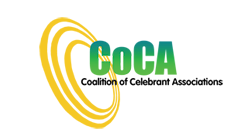- Imposing ‘cost recovery’ charge, to fund administration, ignoring the responsibility for AGD to look at cost savings. We question the effectiveness of and need for, now and in the future, the quality and range of ‘services delivered’ to celebrants. Cost savings to the Department and improvements to administration of the celebrant program could be brought about by reviewing current and expected MLCS staff levels. Implementing the peak body (Coalition of Celebrant Associations) recommendations would bring about savings. For example savings through changes to the ongoing professional development (OPD) program which is currently expensive in administration via a shared model of the Department and the Celebrant Associations setting and monitoring OPD. The Department to attend to ‘legal and interpretation’ subjects, and celebrants (associations, Peak Body, etc.) attending to studies in ceremony and business practices. Further savings could be achieved by the Department taking the The Coalition of Celebrant Associations and the Skills Council recommendations for more rigorous training, selection, assessment and appointment processes for new celebrants. A further saving to taxpayers could be achieved if the former practice of Centrelink and other employment agencies referring unemployed people to marriage celebrancy as a ‘career’ (which it is not) and paying for their training.
- The Bills are said to address – “cost recovery, improve services, effectively regulate, ensure professional, knowledgeable & legally correct services”. However, these points should be argued in light of previous results. Changes/”reforms” previously implemented by the Department arguably brought about diminishment in all these areas. The unwieldy number of marriage celebrants permitted (under the 2003 “reforms”) to service the few marriages in Australia has increased administrative costs, not quality. Increased marriage celebrant professionalism and quality comes from better training standards, opportunities to improve skills & knowledge through conducting ceremonies (few opportunities now), better use of and support of celebrant professional associations (who are managed by volunteer experienced and trained celebrants) by the Department and celebrants themselves (only 70% are members of an association, unlike other professions where membership is mandatory to practice in the profession. Continuation of the Department’s ongoing “reforms”, contrary to the advice of marriage celebrants and their Peak Body, can only worsen the situation.
- Discriminatory imposition of new charges on all Commonwealth marriage celebrants whilst providing non-aligned religious celebrants with advice to avoid the “registration fee’ by becoming a Recognised Religion as they are registered by State & Territory BDMs. These mainstream Recognised religious celebrants and BDM legal officers are not subject to this proposed annual fee, nor anything other than rudimentary training and administration.
- The effect of the proposed changes is to deregister celebrants who do not pay the new annual registration charge which in effect means “dismissal” not based on performance, and could give rise to AAT and other appeals.
- The changes proposed by the Bills propose (39H(1) and (2)) removing regular 5 yearly performance reviews which were argued strongly by the Department in their Recovery Impact Statement as the reason their section required increased and annual funding
- Bills refer to ensuring professional, knowledgeable & legally correct marriage celebrant services. Of course, the Bills cannot, in any way ensure such an outcome. The only thing definite in the proposed Bills is the AGD will gain (substantial) income.
- 39FA terminology in respect to ‘cost recovery – not intended to generate revenue appears contrary to the effect of the Bills. If the current minimum 10,500 Commonwealth registered marriage celebrants are charged $240 in the first year (over twice the fee as announced in the Government’s August Outcomes of its Consultation process. That’s in the order of $2.52 million, plus application fees proposed as $600 for currently over 500 new applications each year, $300,000, plus applications for exemptions, at $30 each, from paying the annual fee (if located remotely – very few) and applications for exemption from ongoing professional development based on causes not explained by the Bills or the AGD. These various amounts add up to somewhat more than the costs of 12 public servants (a significant number employed part-time) and administrative expenses to be funded by 95% Australian civil marriages (as the Department’s own Recovery Impact Statement acknowledged. This becomes even worse if and when the annual registration fee rises to the statutory amount of $600 per celebrants which amounts to $6.3 million without adding ongoing new applications, exemptions, etc. This clearly appears to be designed to ‘generate income’.
- A serious consideration is there is no obligation on the Marriage Law & Celebrant Section to examine cost cutting. The marriage celebrant program (averaging 30 weddings per annum per celebrant pre-2003) was originally administered by one person alone within the AGD, until numbers of celebrants grew out of all proportion (now averaging 6 weddings per celebrant per annum) as a result of errors made by the AGD in choosing to degrade the training entry criteria to one unit of a Tafe style/VET unit rather than the full 11 units Certificate IV in Marriage as advised by celebrant associations in 2002. The AGD also current resists consideration of an increased pre-appoint training options and has resisted considering seriously a cost-effective 5 yearly appointment model that combined “needs based”(numbers based on regional needs to ensure access to sufficient work to maintain and improve knowledge and skills) and competitive selection processes “best candidate for the role” (CoCA recommended independent knowledge and skills assessment by independent trained celebrant assessors) with openings advertised every 5 years for each region.
- The serious escalation in costs is entirely of the Department’s own making. If allowed to continue, either costs will continue to rise to impact upon the marrying public and tax payers and on the quality of services as the pool of Commonwealth marriage celebrants becomes a revolving door of disillusioned inexperienced celebrants being replaced by newly trained and less experienced celebrants.
- The Explanatory Memorandum argues Article 7 of the ICESCR (International Covenant on Economic, Social & Cultural Rights) does not apply in respect to ‘the right of enjoyment of just and favourable conditions of work, including remuneration’. Nonetheless this Covenant conveys a reasonable attitude towards standards applied to ‘workers’ where, in respect to celebrants, there is little hope of just and favourable conditions of work or of adequate remuneration. Discrimination of the basis of belief can not be ignored when Commonwealth Civil Marriage Celebrants who conduct 95% of civil marriages have different and higher training, appointment, ongoing professional development and regulatory conditions than the State Marriage Celebrants that conduct 95% of religious marriages, and the effect of these Bills will now require “Registration” fees of those conducting the 95% of civil weddings, but not religious celebrants. Independent Celebrants, unlike salaried Registry state, work well outside usual hours of work, including weekends and have little protection in respect to conditions of work
- The statutory annual registration fee limit is to be $600 (adjusted by c.p.i.). However, 70 % celebrants protested this the imposition of any fee whatsoever, and almost all protested a $600 pa level exorbitant. Celebrants were then advised by the MLCS the annual fee would be $240. There was absolutely no mention of it remaining at the statutory amount of $600 until the content of these Bills became known.
- Celebrants have concerns over ‘internal reviews’ stated in several sections of the Bills. It is thought any such reviews are not at arm’s length and disadvantage celebrants.
- A further, perhaps unexpected, effect of the Bills where a celebrant is deregistered under 39FB(1) is that any pre-existing clients retaining the services of that celebrant will have their choice of celebrant removed, not as a result of any performance related reason, but by a failure to pay an unwanted and unaffordable annual registration fee.
- A further effect of the ongoing celebrant registrations under the Act, which requires registration or rejection of all new celebrants within 3 months of their application is there is now no mechanism in place (there was in 2002 – 2007) to delay appointments into an already massively over-serviced area
- The ‘cap’ applied in Section 39(E) which the Bills seek to remove as expired, could be reviewed and reimposed to implement ongoing controls on appointments as proposed by the Coalition of Celebrant Associations.


